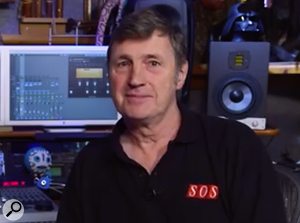Recording our own music has never been more affordable, but there are still some pricing decisions that make little sense to me. For example, an overdrive pedal built around a 25 cent chip might cost you more than a decent computer monitor — or a large-screen HD television come to that. Most overdrive and distortion pedals are fairly straightforward affairs, and while some development is clearly needed to arrive at a workable design, I can’t see how it justifies the frankly silly cost of some of these devices. OK, so maybe some are hand-made on somebody’s kitchen table, but that’s the manufacturer’s decision and it doesn’t make the product any more reliable. Indeed, if you want a ‘hand-made on the kitchen table’ pedal, there are plenty of sensibly priced clone kits to be found online. All you need is a soldering iron and a kitchen table and you can make your own.
 You’ll also be familiar with the ‘just like the old ones’ myth. Many vintage pedals were built around the JRC4558 dual op-amp chip, so including one in a current pedal is seen as some kind of badge of honour. Well I’ve just ordered a box of 100 JRC4558s from China at a total cost of under £4, including postage, so they’re not that esoteric.
You’ll also be familiar with the ‘just like the old ones’ myth. Many vintage pedals were built around the JRC4558 dual op-amp chip, so including one in a current pedal is seen as some kind of badge of honour. Well I’ve just ordered a box of 100 JRC4558s from China at a total cost of under £4, including postage, so they’re not that esoteric.
Then there are buzz phrases such as ‘point-to-point’ wiring — something amplifier manufacturers in particular make a big deal of — but back when valve equipment was somewhat less sophisticated than most of today’s guitar amplifiers, point-to-point wiring was just a way to save money by stringing the components directly between the potentiometers, sockets and valve bases rather than mounting them on tag strip — the latter being a much more mechanically sound and servicing-friendly method of construction.
We’re on safer ground with most recording gear, though it still amazes me that buying a plug-in that purports to emulate an old analogue mixer might actually cost more than a second-hand, perfectly good ‘real’ analogue mixer. Indeed some individual plug-ins might cost more than you paid for your DAW — which probably came with a perfectly good suite of plug-ins and software instruments. Thankfully, if you get on the right mailing lists you’ll see some very attractive ‘weekend special’ pricing.
Some plug-ins, in particular software instruments — Spectrasonics Omnisphere is a good example — involve a huge amount of work creating and editing samples, so the asking price seems very fair to me, but I do occasionally wonder why another company might be asking a similar price for an emulation of a historic equaliser that only the tiniest percentage of today’s engineers and producers are likely to have come across. Maybe it’s the Yorkshireman in me, but I think that a bit of pragmatism goes a long way. If you focus on what you actually need to get the job done, there’s never been a better time to get into recording.
